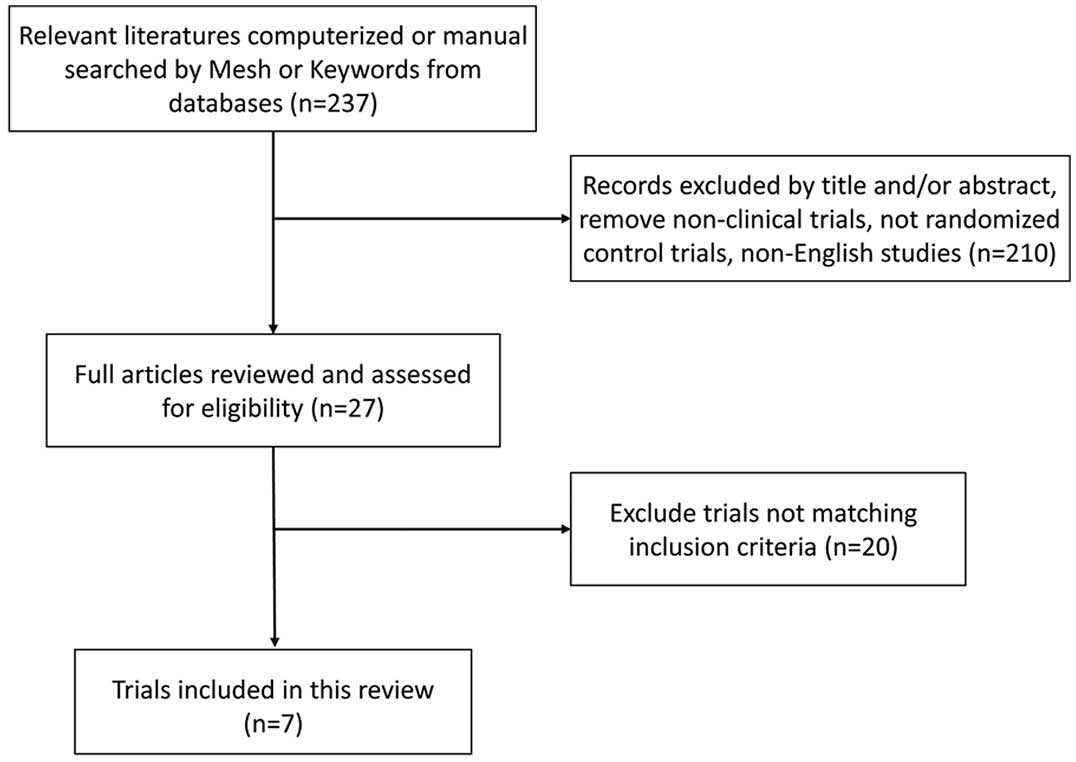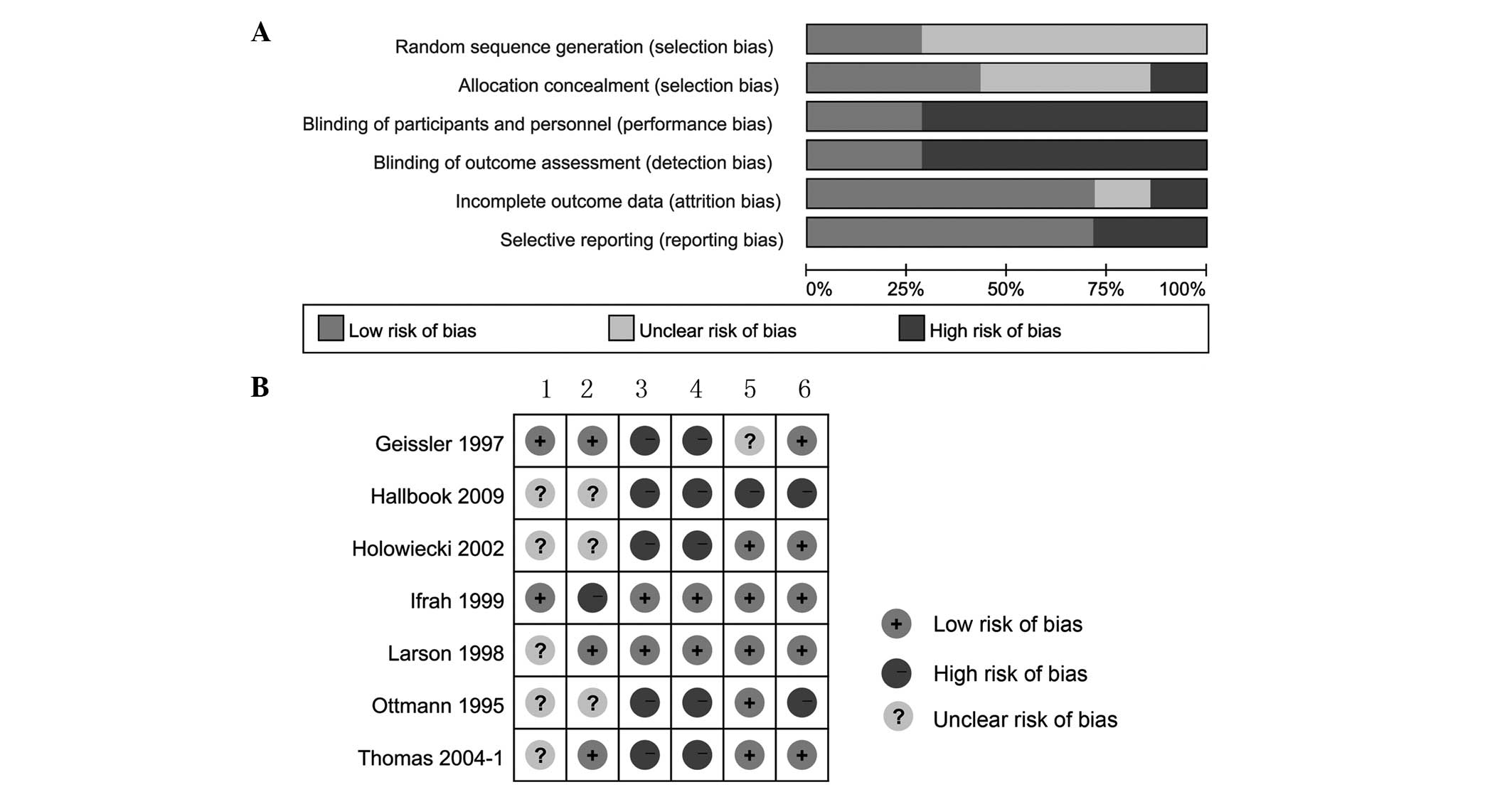|
1
|
Jabbour EJ, Faderl S and Kantarjian HM:
Adult acute lymphoblastic leukemia. Mayo Clinic Proc. 80:1517–1527.
2005. View Article : Google Scholar
|
|
2
|
Siegel R, Naishadham D and Jemal A: Cancer
statistics, 2013. CA Cancer J Clin. 63:11–30. 2013. View Article : Google Scholar : PubMed/NCBI
|
|
3
|
Hiroto Inaba MG and Charles G Mullighan:
Acute lymphoblastic leukaemia. Lancet. 381:1943–1955. 2013.
View Article : Google Scholar : PubMed/NCBI
|
|
4
|
Esparza SD and Sakamoto KM: Topics in
pediatric leukemia-acute lymphoblastic leukemia. Med Gen Med.
7:232005.
|
|
5
|
Pui CH and Evans WE: Acute lymphoblastic
leukemia. N Engl J Med. 339:605–615. 1998. View Article : Google Scholar : PubMed/NCBI
|
|
6
|
Pui CH, Pei D, Sandlund JT, et al:
Long-term results of St Jude Total Therapy Studies 11, 12, 13A, 13B
and 14 for childhood acute lymphoblastic leukemia. Leukemia.
24:371–382. 2010. View Article : Google Scholar : PubMed/NCBI
|
|
7
|
Gaynon PS, Angiolillo AL, Carroll WL, et
al: Long-term results of the children's cancer group studies for
childhood acute lymphoblastic leukemia 1983–2002: a Children's
Oncology Group Report. Leukemia. 24:285–297. 2010. View Article : Google Scholar : PubMed/NCBI
|
|
8
|
Linker C, Damon L, Ries C and Navarro W:
Intensified and shortened cyclical chemotherapy for adult acute
lymphoblastic leukemia. J Clin Oncol. 20:2464–2471. 2002.
View Article : Google Scholar : PubMed/NCBI
|
|
9
|
Kantarjian H, Thomas D, O'Brien S, et al:
Long-term follow-up results of hyperfractionated cyclophosphamide,
vincristine, doxorubicin and dexamethasone (Hyper-CVAD), a
dose-intensive regimen, in adult acute lymphocytic leukemia.
Cancer. 101:2788–2801. 2004. View Article : Google Scholar : PubMed/NCBI
|
|
10
|
Rowe JM, Buck G, Burnett AK, et al:
Induction therapy for adults with acute lymphoblastic leukemia:
results of more than 1500 patients from the international ALL
trial: MRC UKALL XII/ECOG E2993. Blood. 106:3760–3767. 2005.
View Article : Google Scholar : PubMed/NCBI
|
|
11
|
Bassan R and Hoelzer D: Modern therapy of
acute lymphoblastic leukemia. J Clin Oncol. 29:532–543. 2011.
View Article : Google Scholar : PubMed/NCBI
|
|
12
|
Annino L, Vegna ML, Camera A, et al:
Treatment of adult acute lymphoblastic leukemia (ALL): long-term
follow-up of the GIMEMA ALL 0288 randomized study. Blood.
99:863–871. 2002. View Article : Google Scholar : PubMed/NCBI
|
|
13
|
Larson RA, Dodge RK, Burns CP, et al: A
five-drug remission induction regimen with intensive consolidation
for adults with acute lymphoblastic leukemia: cancer and leukemia
group B study 8811. Blood. 85:2025–2037. 1995.PubMed/NCBI
|
|
14
|
Takeuchi J, Kyo T, Naito K, et al:
Induction therapy by frequent administration of doxorubicin with
four other drugs, followed by intensive consolidation and
maintenance therapy for adult acute lymphoblastic leukemia: the
JALSG-ALL93 study. Leukemia. 16:1259–1266. 2002. View Article : Google Scholar : PubMed/NCBI
|
|
15
|
Thomas X, Boiron JM, Huguet F, et al:
Outcome of treatment in adults with acute lymphoblastic leukemia:
analysis of the LALA-94 trial. J Clin Oncol. 22:4075–4086. 2004.
View Article : Google Scholar : PubMed/NCBI
|
|
16
|
Griffin JD: Hematopoietic growth
factorsCancer: Principles and Practice of Oncology. DeVita VT Jr,
Hellman S and Rosenburg SA: 1. 6th. Lippincott Williams &
Wilkins; Philadelphia, PA: pp. 2798–2809. 2001
|
|
17
|
Petros WP: Colony-stimulating
factorsCancer Chemotherapy and Biotherapy: Principles and Practice.
Chabner BA and Longo DL: 5th. Lippincott Williams & Wilkins;
Philadelphia, PA: pp. 357–392. 2001
|
|
18
|
Ozer H, Armitage JO, Bennett CL, et al:
2000 update of recommendations for the use of hematopoietic
colony-stimulating factors: evidence-based, clinical practice
guidelines. American Society of Clinical Oncology Growth Factors
Expert Panel. J Clin Oncol. 18:3558–3585. 2000.PubMed/NCBI
|
|
19
|
The Cochrane Collaboration: Review Manager
(RevMan) 5.2. http://tech.cochrane.org/revman/downloadAccessed.
December 252013.
|
|
20
|
Geissler K, Koller E, Hubmann E, et al:
Granulocyte colony-stimulating factor as an adjunct to induction
chemotherapy for adult acute lymphoblastic leukemia-a randomized
phase-III study. Blood. 90:590–596. 1997.PubMed/NCBI
|
|
21
|
Hallbook H, Bjorkholm M, Hagglund H and
Smedmyr B: Does granulocyte colony-stimulating factor improve
long-term outcome in adult acute lymphoblastic leukemia? Leuk
Lymphoma. 50:1872–1874. 2009. View Article : Google Scholar : PubMed/NCBI
|
|
22
|
Holowiecki J, Giebel S, Krzemien S, et al:
G-CSF administered in time-sequenced setting during remission
induction and consolidation therapy of adult acute lymphoblastic
leukemia has beneficial influence on early recovery and possibly
improves long-term outcome: a randomized multicenter study. Leuk
Lymphoma. 43:315–325. 2002. View Article : Google Scholar : PubMed/NCBI
|
|
23
|
Ifrah N, Witz F, Jouet JP, et al:
Intensive short term therapy with granulocyte-macrophage-colony
stimulating factor support, similar to therapy for acute
myeloblastic leukemia, does not improve overall results for adults
with acute lymphoblastic leukemia. GOELAMS Group. Cancer.
86:1496–1505. 1999. View Article : Google Scholar : PubMed/NCBI
|
|
24
|
Larson RA, Dodge RK, Linker CA, et al: A
randomized controlled trial of filgrastim during remission
induction and consolidation chemotherapy for adults with acute
lymphoblastic leukemia: CALGB study 9111. Blood. 92:1556–1564.
1998.PubMed/NCBI
|
|
25
|
Ottmann OG, Hoelzer D, Gracien E, et al:
Concomitant granulocyte colony-stimulating factor and induction
chemoradiotherapy in adult acute lymphoblastic leukemia: a
randomized phase III trial. Blood. 86:444–450. 1995.PubMed/NCBI
|
|
26
|
Thomas X, Boiron JM, Huguet F, et al:
Efficacy of granulocyte and granulocyte-macrophage
colony-stimulating factors in the induction treatment of adult
acute lymphoblastic leukemia: a multicenter randomized study.
Hematol J. 5:384–394. 2004. View Article : Google Scholar : PubMed/NCBI
|
|
27
|
Bohlius J, Herbst C, Reiser M, Schwarzer G
and Engert A: Granulopoiesis-stimulating factors to prevent adverse
effects in the treatment of malignant lymphoma. Cochrane Database
Syst Rev: CD003189. 2008. View Article : Google Scholar
|
|
28
|
Clark OA, Lyman G, Castro AA, Clark LG and
Djulbegovic B: Colony stimulating factors for chemotherapy induced
febrile neutropenia. Cochrane Database Syst Rev: CD003039.
2003.
|
|
29
|
Renner P, Milazzo S, Liu JP, Zwahlen M,
Birkmann J and Horneber M: Primary prophylactic colony-stimulating
factors for the prevention of chemotherapy-induced febrile
neutropenia in breast cancer patients. Cochrane Database Syst Rev:
CD007913. 2012. View Article : Google Scholar
|
|
30
|
Gurion R, Belnik-Plitman Y, Gafter-Gvili
A, et al: Colony-stimulating factors for prevention and treatment
of infectious complications in patients with acute myelogenous
leukemia. Cochrane Database Syst Rev: CD008238. 2011. View Article : Google Scholar
|
|
31
|
Giebel S, Thomas X, Hallbook H, et al: The
prophylactic use of granulocyte-colony stimulating factor during
remission induction is associated with increased leukaemia-free
survival of adults with acute lymphoblastic leukaemia: a joint
analysis of five randomised trials on behalf of the EWALL. Eur J
Cancer. 48:360–367. 2012. View Article : Google Scholar : PubMed/NCBI
|
|
32
|
Inukai T, Sugita K, Iijima K, et al:
Leukemic cells with 11q23 translocations express granulocyte
colony-stimulating factor (G-CSF) receptor and their proliferation
is stimulated with G-CSF. Leukemia. 12:382–389. 1998. View Article : Google Scholar : PubMed/NCBI
|
|
33
|
Benko I, Kovacs P, Szegedi I, et al:
Effect of myelopoietic and pleiotropic cytokines on colony
formation by blast cells of children with acute lymphoblastic
leukemia. Naunyn-Schmiedeberg's Arch Pharmacol. 363:499–508. 2001.
View Article : Google Scholar
|
|
34
|
Gattei V, Aldinucci D, Attadia V, et al:
Human granulocyte-macrophage colony-stimulating factor supports the
clonogenic growth of B-lineage acute lymphoblastic leukemias
expressing myeloid antigens. Cytokines Cell Mol Ther. 3:141–151.
1997.PubMed/NCBI
|
|
35
|
Lexchin J, Bero LA, Djulbegovic B and
Clark O: Pharmaceutical industry sponsorship and research outcome
and quality: systematic review. BMJ. 326:1167–1170. 2003.
View Article : Google Scholar : PubMed/NCBI
|




















